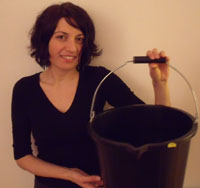Water
Charlie
My eco-challenge was to take daily showers lasting 4 minutes or less, using a timer to make sure that I didn’t go over my 4-minute limit. The aim of my challenge was to show that we don’t need to waste water by always having long, hot showers. When I began my challenge I didn’t find it too hard when I just had to wash, although it was a little more difficult when I had to wash my hair. After doing my challenge, I’ll definitely try to spend less time in the shower, although I may treat myself to a nice long shower once a week.
Gonul
 I challenged myself to use less water. To do this I decided to have “bucket showers“ (a bucket shower consists of scooping hot water over yourself from a bucket - this is the way many people in developing countries shower today). In one minute my shower runs 9 litres of water. I usually spend ten minutes in the shower; therefore, on average a shower uses around 90 litres of water. On the other hand, an average bucket shower only uses between 22 and 25 litres of water. A bucket shower constitutes a saving of between 65 and 70 litres of water per shower. In two weeks of having bucket showers, I saved a total of between 975 and 1,000 litres of water.
I challenged myself to use less water. To do this I decided to have “bucket showers“ (a bucket shower consists of scooping hot water over yourself from a bucket - this is the way many people in developing countries shower today). In one minute my shower runs 9 litres of water. I usually spend ten minutes in the shower; therefore, on average a shower uses around 90 litres of water. On the other hand, an average bucket shower only uses between 22 and 25 litres of water. A bucket shower constitutes a saving of between 65 and 70 litres of water per shower. In two weeks of having bucket showers, I saved a total of between 975 and 1,000 litres of water.
Mark
 My eco-challenge was to wash my clothes by hand in order to save water. The main challenge with this was fitting it into my weekly routine. Because I have a mangle in the garden, I decided to clean it up and use it to get the excess water out of my clothes so that they would dry more quickly on the washing line. One of the most interesting things about this challenge was seeing how much dirt you get out of the clothes! From now on, I’ll continue to hand-wash odd bits and pieces, rather than wasting water by putting a whole wash on unnecessarily.
My eco-challenge was to wash my clothes by hand in order to save water. The main challenge with this was fitting it into my weekly routine. Because I have a mangle in the garden, I decided to clean it up and use it to get the excess water out of my clothes so that they would dry more quickly on the washing line. One of the most interesting things about this challenge was seeing how much dirt you get out of the clothes! From now on, I’ll continue to hand-wash odd bits and pieces, rather than wasting water by putting a whole wash on unnecessarily.
footprints@ncl.ac.uk ©University of Newcastle Date March 2010
